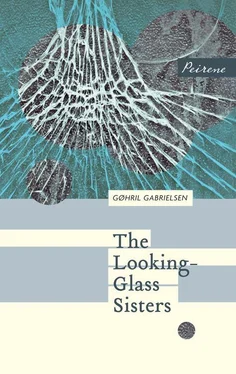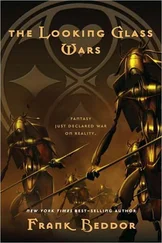Johan chuckles, takes another slice of bread, then slowly and deliberately spreads a thick layer of butter over it.
I have raised my crutch, lifted it up, and now I place the end of it, with its worn-out rubber, on Johan’s wrist. He sits there, completely frozen, looking fixedly at the crutch.
‘Tell your sister to get that bloody thing out of the way,’ he says quietly.
Ragna gets up, grins resignedly, pulls the crutch towards her. But I don’t move it just yet, the cold metal against his skin — a request to surrender. It is impossible to ignore me.
‘Fucking hell,’ Johan says as he quickly stands up, shoving aside the crutch with enough force to cause me to lose balance and fall backwards against the wall. I push with my hands, use all my strength, but gradually slide down the wall and hit the floor. That’s more than I can take, and almost immediately my legs start to quake from the sudden exertion.
Johan wipes his mouth with the back of his hand. ‘What a bloody palaver,’ he says, fetching his jacket, which he’d hung over the chair.
Ragna stands there in confusion, moans in despair, is about to say something, but all she manages to do is to snatch at Johan, who twists out of her grasp and rushes past.
‘Johan,’ she cries out desperately. ‘Johan!’
He turns round at the door, throws his arms out dramatically and rolls his eyes exaggeratedly towards heaven. His whole body says that he cannot do anything, that the problem is not him but with the human scrapheap on the kitchen floor.
As soon as he has shut the door behind him, firmly but with restraint, Ragna is by my side. She tugs at my arm, shakes it, pulls and tears at it in a furious attempt to get me to stand up. Sobbing the whole time.
*
Days and weeks go by. I glide into a soothing rhythm of calm everydayness. It is an illusion, I know that, for beneath the dependable surface conspiracies smoulder, along with my sister’s hot-tempered desire for her own life.
If I am to retain the right to live in this place, I must hone such skills as vigilance and suspicion, and so as to mark this decision, I write these skills on the palm of my hand in capital letters.
That’s a habit I have — to jot down what I am thinking. I immediately write it down on a random piece of paper. I battle for everything combustible in this house — government circulars, sales brochures and the newspapers that are bought every Monday. But Ragna insists on using everything for lighting fires.
‘Can you remember to buy me a notebook?’ I shout out to her whenever she goes shopping in the village.
‘Yes, yes, all right,’ she shouts back impatiently, and slams the door. At other times, I ask for books. ‘Ragna,’ I say, ‘can you drop in at the library on your way home?’ She doesn’t answer, never promises anything, but occasionally, perhaps when several months have passed, she may bring home a bag or two of books. The selection is always a surprise. I suspect her of having randomly snatched them up in passing, for they deal with topics ranging from anatomy and embroidery to the history of art and the hunting licence test. She thinks I don’t particularly mind, that I don’t have any special favourites. And she’s quite right, I read everything; that’s the way I’ve got to know about the world.
Meanwhile, as I’m waiting for paper to write on and new books, I secretly scribble in our ten volumes of the reference work Home University , and I even occasionally read through the old schoolbooks and novels that our parents ordered from a catalogue when Ragna and I were teenagers and they wanted to give us some sort of ‘education’. The books are in my possession — I keep them under the bed; Ragna has never shown any interest in them. So that’s how I’ve been able to fill page after page of Home University , the margins, all the spaces between the lines, the white in-between pages, with everything I’ve thought and felt over the years. I learned to read and write from my parents, but especially from Ragna, who used to be fetched by taxi on certain days of the week and driven to school at the trading centre. It was very tiring — from the crack of dawn to late evening — and after a few years a kind of home-teaching system was devised: Ragna sitting at the kitchen table, grappling with maths problems that made my parents shake their heads in despair. No, you’d better help your sister to read and write instead.
*
Words. They can still make me feel dizzy, even so many years after I first made their acquaintance. But when I cautiously started to change their order in a sentence the dizziness became an obsession. I experienced falling into the deepest well or abyss just by moving a subject, an object, a verb around and changing one or two small words here and there:
My sister and I live on our own, the way to the man in the next house seems slippery and muddy.
Our man slippery and muddy lives in my sister’s house, I’m in the way, on my own it seems.
I steered clear of this game for many years. Then I began to play it again. I dismantle and rebuild for hours. I don’t know why. I feel intoxicated, shake and tremble — and I can’t stop doing it.
*
And my sister? What does she write on her own private sheets of paper that she will never share with me? What complaints does she jot down about her exertions? I realize at once that I don’t care about her complaints. But I would care if they became a letter, a letter that was completed and sent, or if a blank sheet of paper was left lying there, quivering in expectation at the words that were to be formed.
Yes, there must be papers, an application, a confirmation of what she is planning. Can an envelope of special interest have been put in our letter box at the trading post? Can I have failed to notice that Johan, after one of his four or five trips, has come back with the letter she has been waiting for? Can I have overheard the small scratch of agitation in his voice when he flings open the door and shouts: Post! And when they sit down at the kitchen table with a cup of coffee to sort the bills from the ads, can I have failed to notice the tense whispering between them when a particular envelope with the county authority’s elegant stamp is torn open, the suppressed jubilation after quickly reading such sentences as: ‘Your sister has hereby been approved for a place at our nursing home… She will be fetched by our ambulance team at the end of the month… We fully understand your difficult situation and hereby guarantee that your sister has been granted lifelong care…’?
Have these words been read in my proximity without my noticing the ill-will that surrounds them, the cold they release into the room? I feel like hitting myself. It strikes me as a possibility that I have dully and indifferently witnessed the planning of my own deportation.
I sharpen my senses. Follow Ragna’s daily activities with apparent lack of interest from the sidelines, stay more often in the kitchen, keep my bedroom door open and an ear cocked to everything taking place out there: the sound of drawers opening, paper rustling, pen being put to paper. I listen out for possible telephone calls. But everything is as usual, and there is just that sentence quivering between us: You’ve got to go.
*
Ragna is only out of the house on rare occasions, when she goes to the village, which happens less and less now that Johan has taken over the weekly shopping. When she does go, I have my only time alone in the house. Then I take over all the rooms.
I like to look through her drawers — the smell of the wood and a musty tinge from her clothes. Here I find the reverse image of Ragna. Everything she takes care of tells me something different from what is expressed between us. The lace handkerchief, elegantly laid out around the brooch that has two stones missing, the amber ornaments, the old bottle of perfume that’s turned rancid: Ragna’s dreams of something better and finer, dancing and grand parties.
Читать дальше











